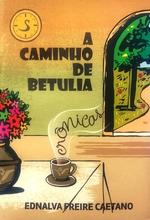Exhortation to hope – Antônio Ponciano Bezerra’s (UFS) review of “A Caminho de Betulia: crônicas”, by Ednalva Freire Caetano

Abstract: Antônio Ponciano Bezerra reviews the book “A Caminho de Betulia: crônicas”, by Ednalva Freire Caetano. The collection of chronicles explores varied themes that include autobiographical accounts, reflections on the pandemic, everyday life in difficult times, the search for hope, personal relationships, memory, nature, religion, time, politics, literature and the art.
Keywords: Chronicles, Hope, Autobiographical Reports.
I begin this review with an aphorism by the Latin elegiac poet, Aulus Abius Tibulus (55-19-BC), another phase of the Roman empire. This reflection by Tibulos is an exhortation to hope. Elegy is not always a bitter, lamentable literary genre. But it serves well to introduce the book of chronicles by Ednalva Freire Caetano, entitled A Caminho de Betulia.

One of the fathers of Western philosophy, Plato (427-348 BC), once stated that “astonishment” is genuinely philosophical emotion, and that one should see emotion as the root of all philosophizing. On the other hand, the great sermonist, Father Antônio Vieira, in addition to the assertion: “nothing will always be a single form”, ventures into a kind of dogma, when he warns us that “the preaching that is speaking, is done with the mouth; preaching, which is sowing, is done with the hand; to speak to the wind, words are enough; to speak to the heart, works are necessary”.
The work A Caminho de Betulia, by the teacher and pedagogue, Ednalva Freire Caetano, focuses, dwells on “the haunts that this world has bequeathed us, and the reflection of its “shadows”, almost always, accompanies our existence “Sombras ” and “astonishments” populate or inhabit our memory, whether of physical situations or of a spiritual, existential nature. This work, On the way to Betulia, reminds me of a chalice, with a bitter content, but filled with hope. Human beings are not programmed, a priori, determined. They are born by chance. They do.
The heroine of this work is the author herself, Ednalva, who, in several moments of her writing, consciously distances herself from what we know as ‘reason, to enhance her feelings, personal experiences, making it clear that ‘truths’ can be tombata, although life today has become cruel, to the point of asking us about the loneliness and helplessness of our existence in this world. Even so, the author relieves us, with passages of humor, hope or even irony. By the way, irony is a very difficult figure of speech to construct, unlike sarcasm or satire, which are destructive figures. Irony is an intelligent and constructive linguistic resource.
All the texts that make up the work in focus are a journey, an adventure, with light inns, the Holy Bible, Philosophy, Literature, Music, Plastic Arts, Cultural History and the rich experience of life (and of the world). ) of the heroine-author. In the bonds of his narrative, it is made explicit that there are human beings on this tyrannical planet, who inject us with hope and give us resistance to cross chasms and cyclones. All texts (regardless of the textual genre) are pages of philosophical wisdom, and, by extension, of experiences and learning that educational practice grants us: from childhood to adulthood.
The son of slaves, with several siblings, “Seu” Francisco wanted to leave the countryside and broaden his horizons, which led him, at the age of fourteen, to a textile factory where, “for a lifelong caipora”, he lost his index finger and medium, which did not prevent him from writing, with a very beautiful cursive handwriting, holding the pen with his thumb and ring finger, with the lightness of the most accurate scribe.
In his case, the fingers were gone and the desire to go even further remained, which meant, as for almost all northeasterners, going to São Paulo, where he lived until he turned 35, when he returned even more knowledgeable, if not in the arts of knowledge, in the arts of living. (Caetano, 2022, p.85).
Illustration by Manuela Freire Caetano de Almeida (Caetano, 2022, p.204)
To demonstrate that the restless, tragic, boiling body of today’s world, as described by the French philosopher, Michel Foucault, when admitting that the human being, nowadays, is sanded down to his visibility, it is also convenient to resort to the bells of hope that rang in the intelligence of the three classics mentioned above, and in the writing of our heroine-author who made her everyday life her work, this work that transmits to us the hope that not everything, in this senseless world, are bells of agony. Ednalva… Freire… Caetano, a life, a story, in each name.
To the reader, happy reading.
References
VIEIRA, Padre Antônio. Sermões. Erechim: Edelbra, 1998.
Summary of A caminho de Betulia: crônicas
- Apresentação
- A Caminho de Betulia
- Cem dias… sem dias
- A vida em 2×4
- Uma arca… Uma ilha… E a esperança…
- Alguma coisa está fora da ordem…
- Quem está ao teu lado?
- O balé da memória
- Se cuide…
- A bruma silenciosa e um auto de fé
- In natura
- Vou-me embora pra Pasárgada…
- Um novo normal?
- Com que máscara eu vou?
- O canto da cigarra
- Lições da natureza
- Um natal cristão?
- Dorme-Maria
- O homem que contava os dias
- Revisitando os quatro cavaleiros do Apocalipse
- Contando as horas
- Um ano contado em dias
- Ainda é longe Canaã?
- Despedida de um ano difícil e desejos para um ano novo
- Dias e noites com Sherazade
- Qual é o seu sonho?
- O chamado do jequitibá
- À sombra do jequitibá
- Em terra de cego quem tem um olho é ciclope
- A organista e o lenhador
- A vida em ent’acte
- “Universo em desencanto”
- O poeta encontra o Salmista
- Um réquiem para o país do carnaval
- Isaque, o islandês
- Monólogo do exílio
- O canto travoso das mães isoladas
- Diálogo pela estrada
- Pobres poderes
- O tempo do medo
- Em nome de Deus vale tudo?
- O cavaleiro do telhado e a dama das sombras
- O Andarilho
- Eu tenho um amigo biso
- Primeira carta a Paulo, o apóstolo
- Segunda carta a Paulo, o apóstolo
- Terceira carta a Paulo, o apóstolo
- Quarta Epístola a Paulo
- Quinta carta a Paulo, o apóstolo
- Sexta carta a Paulo, o apóstolo
- Sétima carta a Paulo e o sétimo selo
- Sob olhar de Frida Kahlo
- A vacina e o castelo de Kafka
- Entre o holograma e a nuvem
- Lembranças
- Boris, Florbela e o tema de Lara
- Presente-Mãe-Presente
- Nas sete horas canônicas o ofício das leituras pela paz
- Diário de Solidão
- Autobiografia
To broaden your literature review
- See book reviews on
- Autobiografia
- Biografia | Biografias
- Esperança | Esperançar
- História da Biografia
- Patrimônio Autobiográfico
- Consult dossiers of articles on
- Auto/Biografia
- Biografia | Biografias
- Escritas (Auto)Biográficas
- Investigação Autobiográfica
- Investigação Biográfica
- Narrativas (Auto)Biográficas
- Pesquisa (Auto)Biográfica
- Pesquisa Biográfica
- Uso de Narrativas (Auto)Biográficas
Reviewer
 Antônio Ponciano Bezerra holds a degree in Vernacular Letters from the Universidade Federal de Sergipe (UFS), a master’s degree in Linguistics from the Universidade Federal de Santa Catarina (UFSC), a PhD in Linguistics from the Universidade de São Paulo (USP) and a postdoctoral degree from the Universidade de Lisboa (UL). He is a professor at the Universidade Federal de Sergipe (UFS), Director of the Centro de Educação Superior a Distância (CESAD) and member of the Conselho Estadual de Educação de Sergipe (CES). He published, among other works, Personagens do folhetim: estereótipos e linguagem (2020), As interações entre a leitura, o oral e a escrita (2016), (Re)Pensando as Licenciaturas (2016). ID LATTES: http://lattes.cnpq.br/1221560896341659; ID ORCID: https://orcid.org/0000-0002-3728-070X; E-mail: [email protected].
Antônio Ponciano Bezerra holds a degree in Vernacular Letters from the Universidade Federal de Sergipe (UFS), a master’s degree in Linguistics from the Universidade Federal de Santa Catarina (UFSC), a PhD in Linguistics from the Universidade de São Paulo (USP) and a postdoctoral degree from the Universidade de Lisboa (UL). He is a professor at the Universidade Federal de Sergipe (UFS), Director of the Centro de Educação Superior a Distância (CESAD) and member of the Conselho Estadual de Educação de Sergipe (CES). He published, among other works, Personagens do folhetim: estereótipos e linguagem (2020), As interações entre a leitura, o oral e a escrita (2016), (Re)Pensando as Licenciaturas (2016). ID LATTES: http://lattes.cnpq.br/1221560896341659; ID ORCID: https://orcid.org/0000-0002-3728-070X; E-mail: [email protected].
To cite this review
CAETANO, Ednalva Freire. A caminho de Betulia: crônicas. Illustrated by Manuela Freire Caetano de Almeida. Aracaju: Criação Editora, 2022. Reviewed by: BEZERRA, Antônio Ponciano. Crítica Historiográfica. Natal, v.3, n.10, mar./apr. 2023. Available in <https://www.criticahistoriografica.com.br/exortacao-a-esperanca-resenha-de-a-caminho-de-betulia-cronicas-de-ednalva-freire-caetano/>. DOI: 10.29327/254374.3.10-11
© – Authors who publish in Historiographical Criticism agree to the distribution, remixing, adaptation and creation of their texts, even for commercial purposes, provided that due credit is guaranteed for the original creations. (CC BY-SA).









